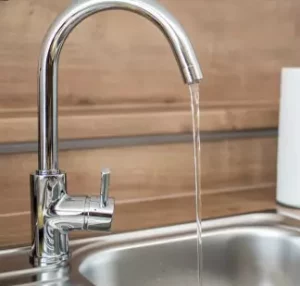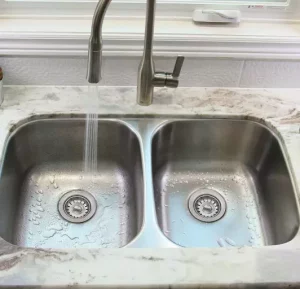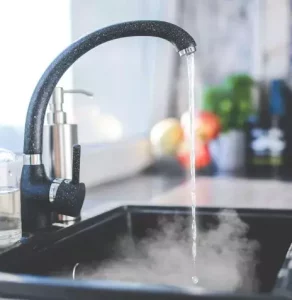Hot water not coming out in the kitchen sink taps is a problem. When you are used to using hot water, you may not want the experience of cold water.
Not only do your critical kitchen chores such as doing the dishes, washing fruit, and delayed cleaning, you risk contracting diseases because cold water cannot entirely kill germs and bacteria.
Therefore, it is important to make sure that hot water is available in your kitchen for use in different activities.
Causes of Hot Water Not Working in the Kitchen
Several reasons can cause kitchen sinks not to have hot water.
Hot water may not be working in the kitchen because of low water pressure in the pipes, too much water blocking, multiple appliances running simultaneously, a broken dip tube, or sediments blocking the water heater tank. To fix the problem, clear up the pressure, remove blockages, or get a plumber to check the pipes.
Let us explore these causes in detail.
1. Low water pressure
You will not get hot water in your kitchen if the water has no pressure. Pressure is crucial for the water heater to work at its best.
In a gauge known as a manometer, the water pressure should be at least between 1 and 1.5 bar. The gauge is usually located where the heater is connected to the water supply pipes.

2. Using a lot of water
Using too much water in your kitchen can lead to a hot water shortage in the kitchen from time to time.
This is caused by the water heater being too small for your big water usage needs.
Also, when water heaters become old they do not function the same way as they used to and can only service reduced water use.
3. Multiple hot water appliances running at the same time
You may lack hot water in the kitchen when the hot shower is running or if other hot water taps in the house are open. This is because the water heater cannot heat the excess water being used. Also the pressure of the water drops.
4. A build-up of sediments on the water heater tank
Sediments from loose minerals such as rust and sand from water supplies settle at the bottom of the water heater tanks.
These minerals end up insulating the water in the tank from the heating source which is located at the bottom of the tank.
5. Broken dip tube
This tube enables cold water to move to the bottom of the tank for it to be heated. If the tube is broken the cold water will remain at the top of the tank meaning that it will not be heated.
Causes of hot water not working in the kitchen but everywhere else
Several reasons can make your kitchen sink the only place in your house without hot water. They include:
1. Blockage in the faucet
If there is no hot water in your kitchen but it is everywhere in the house, then maybe there is a blockage between the water heater and the kitchen sink.
This could be a result of debris build-up and a closed valve in the piping that prevents hot water from flowing.

2. Cartridge issues
This is usually common in single-action kitchen faucets that must have cartridges installed to control the amount of hot and cold water flowing based on how the faucet is turned.
Over time the cartridge collects debris that eventually causes blockages. This can cause faucets with no hot water in your kitchen.
When these blockages occur they prevent hot water from flowing out of your tap making it the only water outlet without hot water in the house.
3. Blockage in the water pipelines
The pipes that connect water to your kitchen may block and prevent hot water from coming out through the kitchen taps. This is caused by rust, heavy metal deposits, and debris from the water supplies.
How to fix the lack of hot water in the kitchen
1. If pressure is the causative factor, you can increase it by opening the valve fully if it is half-shut. Also, if the water in the tank is not much you can pump water into it to increase the pressure. Additionally, spoilt regulators should be replaced to keep the water pressure high.
2. Avoiding using hot water in the kitchen for a long period can prevent the eventual use of cold water. Also, not running many water taps at a time can prevent the use of cold water in the kitchen.
This is because the water heater will be able to heat the water being used that is not in excess amounts. Alternatively, the water heater can be replaced by a more advanced one that can heat a lot of water.
3. To get rid of sediments that build up at the bottom of the tank, the tank can be drained and flushed completely to remove loose minerals such as rust and sand.
Clearing the sediments will provide more space in the tank enabling water to be properly heated. Also, repairing a broken dip tube will enable cold water to be easily moved to the heater at the bottom of the tank
4. To solve issues in the cartridge, it must be removed from the faucet and cleaned. First, the water supply from the faucet should be shut off.
Secondly, the faucet handle should be removed using a screwdriver. Thirdly, the cartridge should be removed from the faucet using needle-nose pliers and then soaked in vinegar to remove all the mineral buildup.
If the water doesn’t get hot after this the cartridge should be replaced. To add to that, clogged faucets can be cleaned by soaking aerators in vinegar overnight to make the mineral build-up in them soften.
How to maintain your hot water plumbing?

1. Inspecting your hot water system
At least once per month, the hot water system should be checked from top to bottom.
You should always look for any wear, cracks, or water leakages.
It is a simple task taking a maximum of five minutes that can save money by dealing with issues before they become worse.
If you inspect your hot water system and find a maintenance task that you are not comfortable doing by yourself, it is important to call a plumber rather than doing it and potentially causing more damage.
2. Get yearly professional services
Do not always wait for a problem to occur to call your plumber. Make sure that you call a plumber to service your whole water system at least once a year.
This is the only way you can ensure that the system is running effectively as it should and get any potential issues pinpointed before they become big problems.
3. Be careful with gardening work around your water system
If your water system is located in a grass area on your homestead always be careful when working in the area.
Lawnmowers and whipper snipers for example can damage pipes that bring water to your system by causing cracks and dents.
4. Turning your hot tank water system off if you are going away for a while
If you are leaving for a week or less do not use this tip. However, if you are going away for more than a week, turn your tank water system off.
The tank will continue to heat water that you are not using. Turning the system off preserves the system to serve you for a longer period and saves gas and electricity.
5. Inspect the relief valve
To inspect the relief valve you will need its manual. If you don’t have it handy, you can google the system and find its manual online.
It is usually important that this valve is working properly because it is designed to relieve excess pressure that builds up in the water heater tank. Inspection should always be done at least every six months.
6. Insulating pipes
Pipes that connect to the water heater should be insulated. This is important, especially in winter seasons when the pipes can reach very cold temperatures.
Insulated pipes prevent water from freezing in the pipes hence protecting them from bursting.


As a homeowner, I am specifically keen on home improvement. I am passionate about homes, yards, and home improvement. I blog on home ideas and reviews on solutions that make homes better.